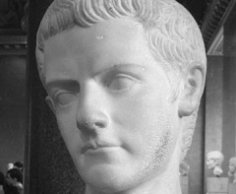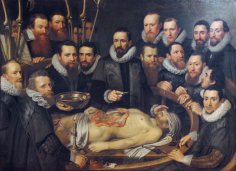
The third Roman emperor's extravagance, eccentricity and cruel despotism are legendary. He is described as a brutal and cruel tyrant with an extraordinary passion for sadism. And this is true, but he was not always like this.
Gaius Caesar Germanicus, better known as Gaius Caesar or Caligula, was born in 12 AD. From birth, Gaius’ destiny was promising and full of promise, as he was the son of very famous parents. His father, Germanicus, was a favorite general of Rome and an adopted grandson of Augustus, cementing his connection with the Julian Clan. His mother, Agrippina the Elder, was a granddaughter of Augustus and the ideal of a Roman woman. The only thing that blighted Caligula’s life was epilepsy, known in Roman times as the “sacred disease,” which the future emperor suffered from since childhood.
When Gaius reached the age of two or three, he became a mascot for his father's army. The soldiers were amused whenever Agrippina dressed Gaius in a miniature soldier's costume. Because of this, he was soon given the nickname “Caligula”, referring to the “little boots” that were part of his costume.
In 14, news of Augustus' death spread throughout the empire. The soldiers of Germanicus' legion nearly started a mutiny, protesting against Tiberius' ascension to the throne, wanting none other than their general as emperor. Germanicus was forced to send Agrippina and Caligula away from the brewing disorder and tried to pacify his soldiers. But the superstitious men were terrified of losing the talisman, and after promising to “behave well,” Caligula was returned.
The new emperor, Tiberius, adopted Germanicus, although he did not love him much. Perhaps jealousy of his popularity was the main reason. Either way, Germanicus died on October 10, 19 AD. During this time, Caligula and his sisters lived first with their great-grandmother Livia, then with their grandmother Antonia, after Livia died in 27. But neither Livia nor Antonia had enough time to look after Caligula. His only outlet was spending time with his sisters: Agrippina the Younger, Drusilla, and Julia Livilla.
From then on, Caligula's life was in constant danger. Tiberius' praetorian prefect, Sejanus, did everything he could to gain power over Tiberius. And it was not difficult for him, Sejanus already controlled Rome, while Tiberius retired to the island of Capri. Outrageous accusations of treason swirled around those closest to the emperor, including most of Caligula's family. His mother, Agrippina, was exiled to the island, where she starved herself to death. His two older brothers, Nero and Drusus, also died. Before Sejanus could destroy Caligula, he was killed by his own weapon – on the basis of a denunciation.
By this time, Caligula was already a favorite of Tiberius, living with him in one of the many villas on the island of Capri. There were rumors of incredible perversions happening on Capri. How much of this is true is hard to say. But such unpopular emperors as Tiberius or Caligula were rarely embellished, and all sorts of rumors are spread throughout the ancient texts.
What Caligula did on Capri is also difficult to say. But he was extremely patient with Tiberius, and showed no displeasure with the old man who had killed his family. He endured and tolerated everything with incredible pretense. But according to the stories of the ancient historian Suetonius, Caligula already then watched with glee the bloody gladiator fights, tortures, wandered around the brothels at night and indulged in debauchery.
In 37, Tiberius died. Whether Caligula was guilty of his death or not is not known for certain. But later he often boasted that he strangled Tiberius with his own hands out of a sense of revenge for his family.
After Tiberius's death, the Roman Senate declared Caligula emperor. The people greeted Rome's new ruler with enthusiasm, remembering their fondness for his father. And Caligula's first few months in power were indeed good. He gave bonuses to the Praetorian soldiers, destroyed the lists of Tiberius' traitors, declaring that treason trials were a thing of the past, freed exiles, and helped those who found the imperial tax system too much of a burden. He was beloved by many simply because he was the son of Germanicus, a young military talisman they all remembered well.
And then Caligula fell ill. Today, we can say that he probably had encephalitis. At least ancient historians like Suetonius and Cassius Dio describe Caligula as having “inflammation of the brain.” Rome waited in terror, begging for their beloved emperor to recover. And he did, but his reign was dramatically changed. No matter how noble his deeds were before, after his illness, Caligula became a monster.
The illness had completely undermined his mental state, he had become completely irrational. In addition, now more than ever he suffered from chronic insomnia and terrifying nightmares at night, and during the day he committed outrages.
Caligula single-handedly decided the fate of the empire's most prominent dignitaries. Some of them were ordered to commit suicide. For others who were objectionable, the emperor always had an executioner at the ready. Caligula was characterized by truly insane extravagance and greed. He squandered Tiberius's entire enormous inheritance in less than a year. And as a result, he introduced an incredible number of all kinds of taxes and levies to replenish the treasury.
For carnal pleasures, Caligula took noble women from their lawful husbands, cohabited with all three of his sisters. Caligula loved his middle sister, Drusilla, especially strongly and, like the others, having taken her from her husband, he kept her as his lawful wife without shame. And after her death, Caligula declared such a mourning, during which any manifestation of joy was considered a mortal crime. He himself, unable to bear the grief of loss, suddenly left Rome at night and went into the desert, and returned just as quickly with his hair and beard grown out.
From then on, he swore all his oaths, even in meetings before the troops and the people, only in the name of the divine Drusilla. Caligula did not love the other two sisters so passionately and did not honor them so much, more than once giving them over to the amusement of his entourage, after which he hypocritically condemned them for debauchery, accused them of wanting to kill him and sent them to the Pontine Islands.
Already in 38, Caligula declared himself a god and began to appear in the clothes of deities and with their attributes – Jupiter's lightning, Neptune's trident and Pluto's staff, and sometimes even in the clothes of Venus. The story of how Caligula tried to make a senator out of his favorite horse is widely known. Ancient sources describe him as a completely insane person. Modern sources often try to explain his madness as a consequence of a spoiled childhood. One thing is certain, he was completely unprepared to become an emperor.
Discontent with Caligula's rule grew, conspiracy followed conspiracy, and finally, on January 24, 41, the last of them ended his life. Caligula was killed. According to Suetonius, after the first blow, Caligula cried out, “I am alive!” – and then the conspirators finished him off with thirty blows, and all had one cry: “Hit him again!” He was only 29 years old. The conspirators also killed Caligula's wife and little daughter, smashing her head against the wall.





